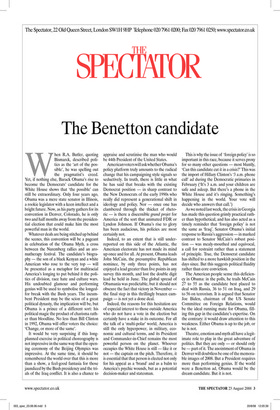The Benetton candidate
When R.A. Butler, quoting Bismarck, described politics as the ‘art of the possible’, he was spelling out the pragmatist’s creed. Yet, if nothing else, Barack Obama’s rise to become the Democrats’ candidate for the White House shows that ‘the possible’ can still be extraordinary. Only four years ago, Obama was a mere state senator in Illinois, a rookie legislator with a keen intellect and a bright future. Now, as his party gathers for its convention in Denver, Colorado, he is only two and half months away from the presidential election that could make him the most powerful man in the world.
Whatever deals are being stitched up behind the scenes, this convention will be a pageant in celebration of the Obama Myth, a cross between the Nuremberg rallies and an aromatherapy festival. The candidate’s biography — the son of a black Kenyan and a white American who rose to the very top — will be presented as a metaphor for multiracial America’s longing to put behind it the politics of division, race hate and culture wars. His undoubted glamour and performing genius will be used to symbolise the longedfor break with the Bush years. The incumbent President may be the scion of a great political dynasty, the implication will be, but Obama is a prince of a different sort: his political magic the product of charisma rather than bloodline. No less than Bill Clinton in 1992, Obama will offer voters the choice: ‘Change, or more of the same’.
It would be very surprising if this longplanned exercise in political choreography is not impressive in the same way that the opening ceremony of the Beijing Olympics was impressive. At the same time, it should be remembered the world over that this is more than a show, a feel-good fantasia for those jaundiced by the Bush presidency and the trials of the Iraq conflict. It is also a chance to appraise and scrutinise the man who would be 44th President of the United States.
American voters will ask whether Obama’s policy platform truly amounts to the radical change that his campaigning style signals so seductively. In truth, there is little in what he has said that breaks with the existing Democrat position — in sharp contrast to the New Democrats of the early 1990s who really did represent a generational shift in ideology and policy. Nor — once one has clambered through the thicket of rhetoric — is there a discernible grand projet for America of the sort that animated FDR or Lyndon Johnson. If Obama’s rise to glory has been audacious, his policies are most certainly not.
Indeed, to an extent that is still underreported on this side of the Atlantic, the American electorate has not made its mind up once and for all. At present, Obama leads John McCain, the presumptive Republican nominee, by only three points, has not enjoyed a lead greater than five points in any survey this month, and lost the double digit lead he held in June. The global spread of Obamania was predictable, but it should not obscure the fact that victory in November — the final step in this thrillingly brazen campaign — is not yet a done deal.
Indeed, the reasons for this hesitation are of especial interest to those outside America who do not have a vote in the election but certainly have a stake in its outcome. For all the talk of a ‘multi-polar’ world, America is still the only hyperpower, in military, economic and cultural terms, and its President and Commander-in-Chief remains the most powerful person on the planet. Whoever occupies the White House is still — like it or not — the captain on the pitch. Therefore, it is essential that that person is elected not only for his appeal as a ‘brand’ and as a balm to America’s psychic wounds, but as a potential decision-maker and statesman. This is why the issue of ‘foreign policy’ is so important in this race, because it serves proxy for so many other questions — most bluntly, ‘Can this candidate cut it in a crisis?’ This was the import of Hillary Clinton’s ‘3 a.m. phone call’ ad during the Democratic primaries in February (‘It’s 3 a.m. and your children are safe and asleep. But there’s a phone in the White House and it’s ringing. Something’s happening in the world. Your vote will decide who answers that call.’) As we noted last week, the crisis in Georgia has made this question grimly practical rather than hypothetical, and has also acted as a timely reminder that ‘foreign policy’ is not the same as ‘Iraq’. Senator Obama’s initial response to Russia’s aggression — in marked contrast to Senator McCain’s robust position — was mealy-mouthed and equivocal, a call for restraint rather than a statement of principle. True, the Democrat candidate has shifted to a more hawkish position in the days since. But this suggests political fluidity rather than core conviction.
The American people sense this deficiency in Obama: in the polls, he trails McCain 27 to 55 as the candidate best placed to deal with Russia, 36 to 51 on Iraq, and 29 to 56 on terrorism. It is argued that Senator Joe Biden, chairman of the US Senate Committee on Foreign Relations, would be the ideal running mate for Obama, filling this gap in the candidate’s expertise. On the contrary: it would draw attention to this weakness. Either Obama is up to the job, or he is not.
Theatre, emotion and myth all have a legitimate role to play in the great adventure of politics. But they are only — or should only be — part of it. The anointment of Obama in Denver will doubtless be one of the memorable images of 2008. But a President requires more than performing genius. If the world were a Benetton ad, Obama would be the dream candidate. But it is not.


























































 Previous page
Previous page